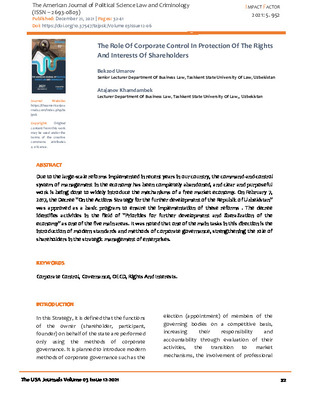The Role Of Corporate Control In Protection Of The Rights And Interests Of Shareholders
Abstract
Due to the large-scale reforms implemented in recent years in our country, the command-and-control system of management in the economy has been completely abandoned, and clear and purposeful work is being done to widely introduce the mechanisms of a free market economy. On February 7, 2017, the Decree "On the Actions Strategy for the further development of the Republic of Uzbekistan" was approved as a basic program to ensure the implementation of these reforms . The decree identifies activities in the field of "Priorities for further development and liberalization of the economy" as one of the five main areas. It was noted that one of the main tasks in this direction is the introduction of modern standards and methods of corporate governance, strengthening the role of shareholders in the strategic management of enterprises.

Downloads
Senior Lecturer Department Of Business Law, Tashkent State University Of Law, Uzbekistan
Lecturer Department Of Business Law

Keywords:
Abstract
Due to the large-scale reforms implemented in recent years in our country, the command-and-control system of management in the economy has been completely abandoned, and clear and purposeful work is being done to widely introduce the mechanisms of a free market economy. On February 7, 2017, the Decree "On the Actions Strategy for the further development of the Republic of Uzbekistan" was approved as a basic program to ensure the implementation of these reforms . The decree identifies activities in the field of "Priorities for further development and liberalization of the economy" as one of the five main areas. It was noted that one of the main tasks in this direction is the introduction of modern standards and methods of corporate governance, strengthening the role of shareholders in the strategic management of enterprises.
References
O‘zbekiston Respublikasi Prezidentining “Kapital bozorini yanada rivojlantirish chora-tadbirlari to‘g‘risida”gi Farmoni // O‘zbekiston Respublikasi Qonun hujjatlari milliy bazasining rasmiy veb-sayti – www.lex.uz.
Котуа Д. Банковский контроль над крупными корпорациями в США. – М., - С.33.
Corporate interest is a common interest for a corporation, a company, an organization. This benefit can be in the form of entering the markets of goods or services together, finding a niche in it, strengthening its position, winning in a competitive struggle, increasing profits or the volume of production of products, dramatically improving the quality of products. .
The World Bank Report (2005), Corporate Governance Report on the Observance of Standards and Codes.
https://www.oecd.org/corporate/ca/Corporate-Governance-Principles-ENG.pdf.
Douma, S. and Schreuder, H. (2013): Economic Approaches to Organisations, London, p.364.
H.R.Rahmonqulov, S.S.Gulyamov. Korporativ huquq. –T.: TDYI nashriyoti, 2008. 255-bet.
Claessens S. Corporate Governance and Development // World Bank Research Observer. – 2006. – № 1. – p. 91-122.
Berle A.A, Means G.C. The modern Corporation and Private Property. New York: Macmillan, 1932.
Л.Н. Тепман. Корпоративное_управление. - М.: ЮНИТИНИ-ДАНА, 2015. - 182 с.
Ибрагимова А. Р. Систематизация законодательства внешней торговли-залог успешного осуществления бизнес-деятельности //Молодой ученый. – 2019. – №. 20. – С. 312-315.
Aksiyadorlik jamiyatlari faoliyati samaradorligini oshirish va korporativ boshqaruv tizimini takomillashtirish bo'yicha komissiya Majlisining 2015-yil 31-dekabrdagi 9-son bayonnomasi bilan tasdiqlangan Korporativ boshqaruv kodeksi.
Prepared on the basis of data from the state statistics office. www.stat.uz
Jumagulov, A. E. "STAGES OF DEVELOPMENT OF THE LEGISLATION ON INVESTMENT FUNDS IN UZBEKISTAN." Herald pedagogiki. Nauka i Praktyka 1.5 (2021).
Худайбергенов, Бехзод Бахтиёрович. "ПРАВОВЫЕ АСПЕКТЫ ВЫЯВЛЕНИЯ ПРИЗНАКОВ НЕПЛАТЕЖЕСПОСОБНОСТИ: CASH FLOW И BALANCE SHEET." Review of law sciences 4 (2020).
Aktiengesetz von Sept. 6, 1965 (Bundesgesetzblatt).
O‘zbekiston Respublikasining “Aksiyadorlik jamiyatlari va aksiyadorlarning huquqlarini himoya qilish to‘g‘risida”gi Qonuni (yangi tahriri) // O‘zbekiston Respublikasi Qonun hujjatlari milliy bazasining rasmiy veb-sayti – www.lex.uz.
O‘zbekiston Respublikasining “Aksiyadorlik jamiyatlari va aksiyadorlarning huquqlarini himoya qilish to‘g‘risida”gi Qonuni (yangi tahriri) // O‘zbekiston Respublikasi Qonun hujjatlari milliy bazasining rasmiy veb-sayti – www.lex.uz
O‘zbekiston Respublikasining “Aksiyadorlik jamiyatlari va aksiyadorlarning huquqlarini himoya qilish to‘g‘risida”gi Qonuni (yangi tahriri) // O‘zbekiston Respublikasi Qonun hujjatlari milliy bazasining rasmiy veb-sayti – www.lex.uz





